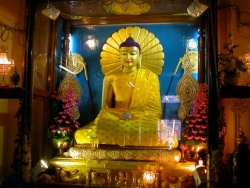That crucial qualifying phrase seems to be Dharmakirti's addition to Dignaga
It is not a dodge provided that one adds, as Dharmakirti does, a qualifying phrase. What he says is that the failure to observe something
THAT WOULD BE OBSERVED IF IT WERE PRESENT suffices to prove that it is absent. That crucial qualifying phrase seems to be Dharmakirti's addition to Dignaga
- Yes, I think it is. The phrase he used is upalabdhi-lak.sa.na-praapta, and it occurs in most of Dharmakiirti's works.
Ono's KWIK index to Sanskrit terms in Dharmakirti shows 30 occurrences of the expression in the extant Sanskrit texts of Mr Kirti, most in PVSV but several in Nyaayabindu, Hetubindu and Vaadanyaaya.
Allowing for non-observable "reals" would, as you observe, open the door to all sorts of unfalsifiable metaphysical and theological assertions, so if Dharmakirti is really opening that door here, that would curious.
Dharmakirti makes a number of questionable moves. It seems to me that at least some of them derive from his being such a polemicist.
He argued stridently against the authority of the Vedas and then seemed to realize that his arguments also undermined the authority of the Buddhist sutras.
So he had to find a way to defend them without also giving credence to the scriptures of other schools.
Most of his arguments against the existence of God would also undermine belief in bodhisattvas.
Most of his arguments for the possibility of rebirth leave the door open for belief in aatman, brahman, God and the tooth fairy.
The poor guy was always doing damage control. On my reading of Dignaaga, which is shared by Claus Oetke and John Taber but strenuously criticized by my friend and teacher Shoryu Katsura, Dignaaga created far fewer problems for himself, because he was less interested in upholding Buddhist dogmas than in exploring the limits of our knowledge about anything.
Now that the Vienna circle have uncovered the Sanskrit of Jinendrabudhi's commentary to Dignaaga's Pramaa.na-samuccaya and thereby reconstructed big chunks of the PS, we'll be able to see how accurate the translations produced by Hattori, Kitagawa and me were.
I'm expecting to be very thoroughly humbled by the discovery of innumerable gaffes and blunders in my earlier work. But hell, that's the reason we publish our work---to see it superseded by others.
I would be a little disappointed but not at all surprised if it should come to light that my views on the relationship between Dignaaga and Dharmakiirti were somewhere between dead wrong to slightly correct but quite exaggerated.
My view that Dignaaga was a subtle thinker who was ignored after a philosophical hack named Dharmakiirti misinterpreted him may turn out to be just another of my Romantic fantasies about geniuses being overshadowed by dull-witted but very popular drones.
-- Richard Hayes [[Department of[Philosophy]] University of New Mexico
